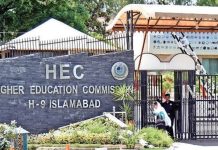Staff Report
ISLAMABAD: Clive Stafford Smith, the lawyer of incarcerated Dr Aafia Siddiqui, on Tuesday appeared before the Islamabad High Court, media reported.
IHC resumed hearing the case concerning Dr. Aafia Siddiqui, currently imprisoned in the United States, in which her American counsel Clive Stafford Smith appeared and strongly condemned her treatment in custody.
Clive Smith informed the court that Dr. Aafia Siddiqui is facing extremely inhumane conditions in the US prison. Meanwhile, the federal government filed a miscellaneous application seeking dismissal of the petition, arguing that its core objective had already been fulfilled.
However, Fowzia Siddiqui’s counsel countered, stating that multiple reliefs were sought in the original petition, many of which remain unresolved. They have also requested permission to amend the petition to include new grounds for relief.
Justice Sardar Ejaz Ishaq Khan, while addressing the argument, remarked that petitioners may file a fresh application referencing the new grounds.
The counsel, however, expressed concern that a new petition could be assigned to another bench, potentially delaying justice.
Legal arguments also touched upon procedural concerns. The court observed that if an interim order is passed in favor of the miscellaneous application, it could be challenged in the Supreme Court, as has happened in similar cases before.
The hearing has been adjourned till next week as deliberations continue on the admissibility and scope of amendments to the petition.
Aafia Siddiqui was born in 1972 into an educated family in Karachi. She pursued her studies in the United States, earning a PhD in neuroscience from Brandeis University in 2001.
Known for her academic brilliance and religious devotion, her life took a significant shift when she was accused of having ties to ‘extremist organizations’ following the 9/11 attacks.
In 2008, she was arrested in Ghazni, Afghanistan, under controversial circumstances.
She was accused of attempting to shoot American soldiers during an interrogation session, an incident that forms the core of the charges against her.
The U.S. authorities claimed that the Pakistani doctor, despite being detained, managed to grab a rifle and opened fire, though she did not hit anyone. In response, the U.S. personnel shot her in the abdomen, severely wounding her.





